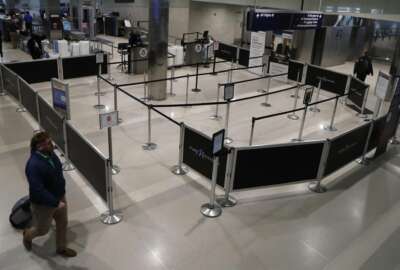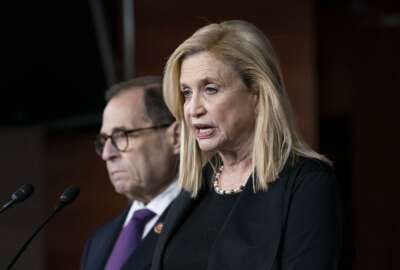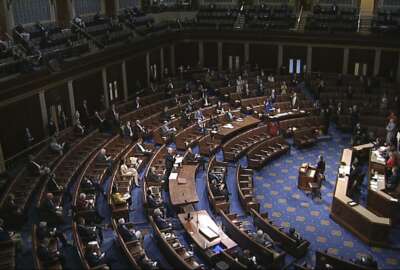
Vacation on hold? House bill would allow feds to carry over unused annual leave
A new bill from Rep. Jennifer Wexton (D-Va.) would allow federal employees to federal employees can hold onto the annual leave they may have to forfeit at the end...
Some federal employees likely aren’t taking vacation right now, either because they’re under state stay-at-home orders or there’s simply too much work to do — or some combination of both.
A few House Democrats are eyeing new legislation that would ensure federal employees can hold onto the annual leave they’d otherwise have to forfeit at the end of the year.
Rep. Jennifer Wexton (D-Va.) introduced the Federal Frontline Worker Leave Protection Act, which would specifically allow employees to carry over unused annual leave due to the coronavirus pandemic.
Under existing policy, most federal employees can carry up to 30 days of leave to the next year. Any accrued leave that’s left is usually gone.
But current statute does allow agencies to restore forfeited annual leave to federal employees, but only in specific circumstances. Agencies could, according to regulations from the Office of Personnel Management, restore lost annual leave when there’s an “exigency of public business.”
This may include scenarios where there’s an urgent need for an employee to be at work and therefore can’t use his or her annual leave, OPM has said.
Wexton’s bill would specify the current coronavirus pandemic as an “exigency of public business” for the purposes of restoring annual leave lost before, during or after the date of the legislation’s enactment.
“During the unprecedented challenges of COVID-19, our federal workers are stepping up and working tirelessly to help Americans weather this crisis,” Wexton said Tuesday in a statement. “It’s all hands on deck right now and taking time off is not an option for many federal employees. Federal workers should not be forced to lose their benefits while they carry out the essential work of government. We owe it to them to protect what they’ve earned.”
The bill has a few co-sponsors, including Reps. Don Beyer (D-Va.), Stephen Lynch (D-Mass.) and Jamie Raskin (D-Md.), as well as District of Columbia Del. Eleanor Holmes Norton.
The Pentagon issued related guidance on leave for military members last month. The Defense Department is allowing active-duty members to accrue more leave than usual— anywhere from 60 to 120 days — and hold on to it through 2023.
DoD’s stop move orders, which run through at least June 30, are clearly preventing servicemembers from using their leave, Matthew Donovan, the undersecretary of Defense for personnel and readiness, said.
“Leave is vital to the continued health and welfare of our service members and civilian workforce and is key to the Secretary of Defense’s first priority in responding to COVID-19-protecting our service members, DoD civilians, and their families,” he said in the guidance.
Beyond Wexton’s legislation on annual leave, several other congressional members have introduced bills of their own that would compensate or protect federal employees working through the pandemic.
Push for federal hazard pay continues
Congressional Democrats have been most vocal in advocating for hazard pay for federal employees working on the frontlines of the pandemic, but there are signs of bipartisan support.
Nearly 20 senators, led by Chris Van Hollen (D-Md.) and Susan Collins (R-Maine), are urging the Trump administration to work within its own authority to authorize hazard pay for frontline federal employees.
“The statute provides for hazardous pay differentials for duties involving unusual hazards that are not typical for the job, which certainly describes the current situation for many workers,” senators said in a May 5 letter to OPM and the Office of Management and Budget. “We further urge you to issue guidance for agencies to negotiate equitable adjustments with contractors to provide similar hazard pay to contractor employees.”
As Congress continues its discussions on a possible fifth coronavirus relief package, members on multiple occasions have recommended hazard pay for federal employees.
Rep. Donald Payne (D-N.J.) introduced his own legislation, which instructs OPM to create a schedule of hazardous duty pay differentials specifically for employees, including screeners at the Transportation Security Administration, who contract or have been exposed to coronavirus at work.
Hazard pay would be retroactive to March 15 and would run through the end of 2020, according to the Hazardous Duty Pay for Frontline Federal Workers Act.
Separate legislation, which Rep. Val Demmings (D-Fla.) introduced last week, would automatically entitle any TSA worker who contracts coronavirus within the next two years to disability and other benefits.
Meanwhile, Senate Democrats have been pushing for $25,000 pandemic premium payments for essential federal employees working on the frontlines of the coronavirus crisis.
A bicameral group of Democrats last week asked congressional leaders to include a “bill of rights” for essential workers in the next coronavirus relief package. Hazard pay, retroactive to the beginning of the pandemic, is on their wish list for essential workers, which includes federal employees.
And two of the top leaders on the House Oversight and Reform Committee offered up their own list of proposals for federal employees and contractors, including a recommendation that would allow participants in the Federal Employee Health Benefits Program (FEHBP) to make changes to their insurance during the pandemic.
Beyond legislation, the bipartisan group of 19 senators are seeking clearer guidance on telework and leave for federal employees during the pandemic.
“Maximizing telework should generally mean that anyone who is able to telework should be teleworking full time, and agencies should enable telework for as many federal workers and contractor personnel as possible,” the senators wrote. “We also urge you to provide agencies with guidance to provide flexibility so that employees can adjust their schedules without a reduction in pay to accommodate needs to care for children and family members.”
Both OPM and OMB have issued guidance on telework and weather and leave safety leave on multiple occasions during the pandemic, but federal employees have said their agencies are implementing it inconsistently.
The senators also urged the administration to collect employee feedback about their experiences on the frontlines. Due to the pandemic, OPM delayed the start of the Federal Employee Viewpoint Survey and tentatively pushed collection back to July 13.
Copyright © 2025 Federal News Network. All rights reserved. This website is not intended for users located within the European Economic Area.
Nicole Ogrysko is a reporter for Federal News Network focusing on the federal workforce and federal pay and benefits.
Follow @nogryskoWFED
Related Stories






